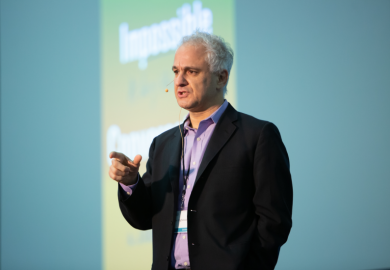Editors: Julian Savulescu and Nick Bostrom
Publisher: Oxford University Press
Edition: First
Pages: 432
Price: £44.00 and £19.99
ISBN 9780199299720 and 9594962
Who wouldn't want for themselves, or for their friends or children, a better memory, a neater waistline, a more winning smile? Who wouldn't want a longer, happier life? Some sorts of improvement, both for ourselves and for others, have been around for a long time - high-heeled shoes to make you look taller, coffee to help you work through the night, schools and universities to sharpen up your mind. Enhancement, then, is hardly new.
What is different now is, first, the use of biotechnologies to bring about such changes and, second, the real possibility of germ-line modifications - so that it's not only your children but theirs as well who get the benefit.
The difficult moral issues involved (should such alterations be permitted? should they in some cases be required?) are well explored in this collection of 18 essays. Most are punchy and accessible, and together cover all the reputable positions in this lively and timely debate.
Many of the questions are familiar. Are there important differences between improvement and repair? Between tweaking the body and the mind? Can we usefully separate out familiar, natural, gradual change from the extraordinary, sci-fi, one-step variety? Is there a difference between trivial and serious alterations?
How should these questions be answered? Carefully; one at a time. The message here is that no one can reasonably be against enhancement tout court. And the blanket objections - that we're playing God, that we'll end with a society of winners and losers, that we'll lose control of our lives - all fail. Equally, it seems, no one can be, blindly and uncritically, a pro-enhancer. So there's a balance. Perhaps.
But look more closely. The editors of this volume, Julian Savulescu and Nick Bostrom, are notoriously gung-ho about much of this, and even if they are presented in their quiet Sunday best for this book's blurbs and introduction, what some readers will see as their darker side isn't far below the surface.
The book is derived from a conference on improving human nature. Getting a new pair of spectacles is one thing; modifying human nature - and forever - will strike many as another thing entirely.
Bostrom, in particular, is apparently all for this. His transhumanist agenda wants us to be open to deep changes, making ourselves or our successors into a different and supercharged species, or maybe simply moving aside if there's already such a species out there. And the cover design - a bunch of Identikit musclemen - is pretty scary if you think about it.
Still, scary can be good. Who couldn't get a class interested in such stuff? Whether it's philosophy or current affairs, medical school or sports science, social and political studies or just the local book club, there's plenty here to get your enhanced teeth into.
Who is it for? Philosophers, ethicists and medical students at undergraduate and graduate levels.
Presentation: A well-balanced and up-to-the-minute collection, with a useful scene-setting and signposting introduction.
Would you recommend it? Unreservedly. An excellent volume.
Recommended
Everything You Always Wanted to Know about Lacan (But Were Afraid to Ask Hitchcock)
Editor: Slavoj Zizek
Edition: Second
Publisher: Verso
Pages: 304
Price: £16.99
ISBN 9781844676217
Register to continue
Why register?
- Registration is free and only takes a moment
- Once registered, you can read 3 articles a month
- Sign up for our newsletter
Subscribe
Or subscribe for unlimited access to:
- Unlimited access to news, views, insights & reviews
- Digital editions
- Digital access to THE’s university and college rankings analysis
Already registered or a current subscriber? Login



